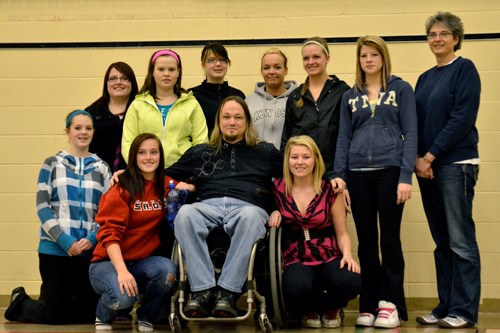Tom Melin's only concern when he drove drunk was getting caught by police.
His worst nightmare came true one night while booze cruising when he noticed flashing lights in his rear-view mirror. He passed his dexterity test with ease, but to be on the safe side, police asked the 17-year-old to take a breathalyser test. Melin blew .17. The officer was shocked and appalled that a 17-year-old could blow so high, and not appear drunk.
Sentenced to rehab, Melin lost his license for one year and paid a large amount of money in fines, insurance and court costs.
Though a wake-up call for some, Melin continued to abuse alcohol.
"My life changed forever on Saturday, Sept. 7, 1996," he said.
Melin was quite intoxicated after barhopping with friends for most of the night. Friends offered him a ride home, but he refused.
"I was five houses away from home when I lost control," Melin told a quiet audience. "I hit a telephone poll, three trees and a house at 130 miles per hour in my new Camero. I was thrown from the car, landed on the roof of the house, rolled down the roof and ended up on the porch."
The moments that followed were plagued with confusion. Melin could not remember how the collision occurred.
"When the alcohol wore off, I was in terrible, terrible pain," he said. "My liver was injured, I had abrasions on my body, a broken pelvis, several broken ribs and two vertebrae broken in my spine."
"I was paralyzed."
Faced with his new reality, the Michigan native re-learned how to do things most people take for granted.
He shared his harrowing journey with students to teach them of the real-life dangers of alcohol and drug abuse.
"I lived it," said Melin. "I put a lot of people at danger and feel I need to give back."
Students watched a 35-minute documentary call Forever Changed about Melin, and as it finished, the 40-year-old rolled into the gym. Everyone appeared shocked to see this man with long hair, casual clothing and an eyebrow piercing in a wheelchair.
Melin shared his story firsthand with students, who appeared more attentive hearing it from someone who lived it.
"Everything I'm telling you is from experience," he said to the students.
He encouraged the students to break the cycle and not to drink like their parents.
"Kids are suffering from the actions of their parents. Kids swear they are never going to be like their parents, but no one aspires to be an alcoholic," said Melin. "It's a progression."
After sharing a couple additional personal stories of people who lost their lives to drug or alcohol abuse, he opened the floor to questions.
The first question regarded his transition from walking to 小蓝视频 in a wheelchair. He explained that as a naturally independent person, he did not take his confinement lightly.
"The hardest part was admitting I needed help."
Melin gave students an insight into adaptations he made in his life, from learning to drive again to modifying the way he went to the bathroom.
The last question asked Melin when he became sober.
After a long pause, he started into a shocking story of how, after years of insisting he was in control, he finally admitted to himself he had a serious problem.
His days were spent working; his nights, partying.
"I thought, 'There's no way I'm going to go home, sleep an hour and then hear that alarm clock,' so I'd go to the clubs and I'd pick up an eight-ball of cocaine and go to work. But I didn't have a problem because I made it to work every day and paid my bills," Melin told the students. "After my accident, well since I didn't have a problem, I just kept doing what I was doing. Cocaine, sure it got a little worse, and I may have started slamming it in my arm. Then, I started smoking crack. But I didn't have a problem. I wasn't an addict."
"When it became a $1,000 a week crack habit, I decided I might have a problem," he continued. "But rather than ask for help, I decided - and in a whole list of dumb ideas, this was at the top - that if I didn't have any drug dealers to call, I couldn't get drugs. So, I fronted dope from all of them and then I didn't pay them back. Note to self: drug dealers don't like that."
"After having my house shot up two or three times - with me in it - I decided I might want to sell my house and move. I moved into an apartment complex and day one, I met the local crack dealer in the apartment complex. So, I thought I can't move away from it. I just kept struggling, and rather than asking for help I just kept struggling and using, and doing everything I could to stop."
"I was finally able to, but it was hell. The only reason I was able to stop was because I was in this chair. I got to a point where I was able to stay off of it, and now, this is my rehab, [speaking to students]."
Melin turned his life around in 2004 - eight years after his accident - and has been clean and sober ever since. He now dedicates his life to sharing his story with others in hopes that they will realize how quickly they can become "other people."
"I thought 'other people' got into accidents," he said. "Not me."
For more information on Tom Melin, visit his website at www.foreverchangedLLC.com.




